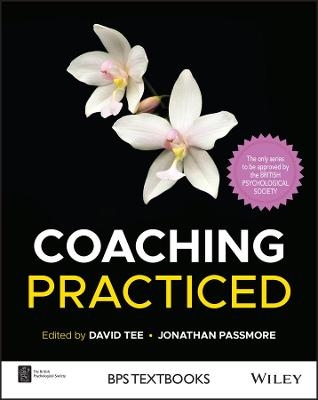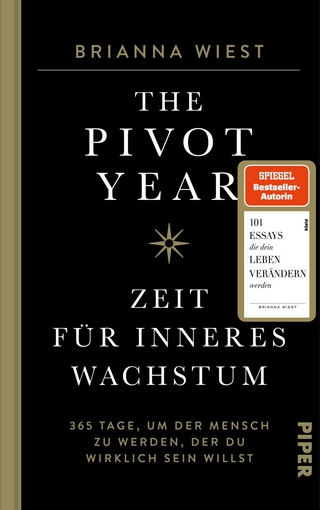
Coaching Practiced
John Wiley & Sons Inc (Verlag)
978-1-119-83569-1 (ISBN)
A collection of the best papers over the last 15 years from the journal The Coaching Psychologist.
In Coaching Practiced: Coaching Psychology Tools, Techniques, and Evidence-Based Approaches for Coaches, a team of distinguished researchers delivers an insightful and complete handbook for practicing coaches. From wellbeing to the workplace, coaches of all stripes will find a fulsome discussion of effective methods, strategies, and frameworks for coaching clients.
In the book, the editors include contributions from leading experts that discuss a wide variety of essential topics in the field, including cognitive approaches, motivational interviewing, solution-focused coaching, mindfulness approaches, narrative coaching, and the influence of positive psychology in the field of coaching.
In this accessible and comprehensive resource, readers will also find:
A thorough introduction to the psychology of coaching, including available frameworks
In-depth examinations of reflective practice and professional development, including reflective journaling
Comprehensive discussions of wellbeing coaching, including health and life coaching
Fulsome explorations of workplace coaching, including the Lead, Learn, and Grow Model
Perfect for organizational and athletic leaders, Coaching Practiced: Coaching Psychology Tools, Techniques, and Evidence-Based Approaches for Coaches will also earn a place in the libraries of professional coaches, managers, executives, and others.
DAVID TEE is Global Director of Science, CoachHub, the digital coaching platform, Chair of the Wales Coaching Centre at the University of South Wales and editor of The Coaching Psychologist. JONATHAN PASSMORE is Senior Vice President, CoachHub, the digital coaching platform, professor of coaching and behavioural change, Henley Business School. He is a licensed psychologist, an award-winning coach, researcher, and author. He is the editor of the eight volume Wiley Blackwell Series on Industrial Psychology, plus some 30 other titles.
Section 1 The Psychology of Coaching: Coaching Psychology – Eclectic Approaches and
Diversity in Practice
Section 2 Coaching Frameworks: The Role of Frameworks, Models and Approaches in Coaching
Chapter 1 SPACE: A psychological model for use within cognitive behavioural coaching, therapy and stress management
Nick Edgerton & Stephen Palmer
Chapter 2 PEAK: A model for use within performance coaching
Garret O’Moore
Chapter 3 Is it time to REGROW the GROW model? Issues related to teaching coaching session structures
Anthony M. Grant
Chapter 4 A pluralistic approach to coaching
Zsófia Anna Utry, Stephen Palmer, John McLeod & Mick Cooper
Section 3 Reflective Practice and Professional Development: Introduction
Chapter 5 The scientist-practitioner model as a framework for coaching psychology
Sarah Corrie & David A. Lane
Chapter 6 Peer coaching framework: An exploratory technique
Manfusa Shams & Ho Law
Chapter 7 Reflection, note-taking and coaching: If it ain’t written, it ain’t coaching!
Anthony M. Grant
Chapter 8 Building reflective capability to enhance coaching practice
Louise Kovacs & Sarah Corrie
Section 4 Wellbeing Coaching: Introduction
Chapter 9 The impact of depression on the coaching process: How to recognise the signs and what to do next
Kasia Szymanska
Chapter 10 Anxiety and the coaching relationship: How to recognise the signs and what to do next
Kasia Szymanska
Chapter 11 Anxiety and the coaching relationship: How to recognise the signs and what to do next (Part 2)
Kasia Szymanska
Chapter 12 The challenges of working with emotion in coaching
Peter Duffell &
Section 5 Workplace Coaching: Introduction
Chapter 13 Growing the ‘I’ and the ‘We’ in Transformational Leadership: The LEAD, LEARN & GROW Model
Mary Watts & Sarah Corrie
Chapter 14 Leadership Coaching? No thanks, I’m not worthy
Vicky Ellam-Dyson & Stephen Palmer
Chapter 15 Can cognitive behavioural team coaching increase well-being?
Ulrika Hultgren, Stephen Palmer & Siobhain O’Riordan
Chapter 16 Coaching approaches for a lost sense of self – hunt it down or let it be?
Tessa Dodwell
Section 6 Cognitive Approaches
Chapter 17 A behavioural approach to BIG problems encountered in coaching: Behaviour
Incompatible with Goals
Stephen Palmer & Christine Dunkley
Chapter 18 Rational Coaching: A cognitive behavioural approach
Stephen Palmer
Chapter 19 Searching for shades of grey: Modifying polarised thinking with continuum methods
Sarah Corrie
Chapter 20 The application of the responsibility pie technique in coaching
Garret O’Moore
Chapter 21 Deserted Island technique: Demonstrating the difference between musturbatory and preferential beliefs in cognitive behavioural and rational coaching
Stephen Palmer
Section 7 Motivational Interviewing: Introduction
Chapter 22 Motivational Interviewing – a model for coaching psychology practice
Jonathan Passmore
Chapter 23 Motivational Interviewing techniques reflective listening
Jonathan Passmore
Chapter 24 MI – Balance sheet techniques
Jonathan Passmore
Chapter 25 MI techniques: The Typical Day
Jonathan Passmore
Chapter 26 MI techniques: Recognising change talk
Jonathan Passmore
Chapter 27 MI techniques: Agenda Mapping
Jonathan Passmore
Chapter 28 Motivational Interviewing: Reflecting on
ethical decisions in MI
Jonathan Passmore
Section 8 Solution-Focused Coaching: Introduction
Chapter 29 ENABLE: A solution-focused coaching model for individual and team coaching
Mark Adams
Chapter 30 Steps to Solutions: A process for putting solution-focused coaching principles into practice
Anthony M. Grant
Chapter 31 Solution-focused coaching: The basics for advanced practitioners
Anthony M. Grant
Chapter 32 Revisiting the ‘P’ in the PRACTICE coaching model
Stephen Palmer
Section 9 Mindfulness: Introduction
Chapter 33 The role of mindfulness in coaching
Jonathan Passmore & Oberdan Marianetti
Chapter 34 Mindfulness in coaching: A model for coaching practice
Jonathan Passmore
Chapter 35 Mindfulness in coaching: Identifying environmental distractions
Jonathan Passmore
Chapter 36 ‘Mindfulness in Coaching’: STOP
Jonathan Passmore
Chapter 37 Mindfulness in coaching: Choosing our attitude
Jonathan Passmore
Chapter 38 Mindfulness in coaching: Being the observer
Jonathan Passmore
Chapter 39 Coaching through walking
Arthur Turner
Section 10 N arrative Coaching: Introduction
Chapter 40 Narrative coaching – Part 1: An introduction and the first step
Ho Law
Chapter 41 Narrative coaching – Part 2: Two forms of change structures: re-authoring and remembering
Ho Law
Chapter 42 Narrative coaching – Part 3: Approaches for groups, teams, organisations and community
Ho Law
Chapter 43 Narrative coaching – Part 4: Redesigning the GROW model as the 4th generation coaching
for people and the planet
Ho Law
Chapter 44 Using the four gateways to tell new stories and make new choices
David Drake
Chapter 45 Creating zones of proximal development in coaching: The power of working at thresholds
David Drake
Section 11 Positive Psychology: Introduction
Chapter 46 Positive Psychology Coaching – a model for coaching practice
Jonathan Passmore & Lindsay G. Oades
Chapter 47 Positive Psychology Techniques – Active Constructive Responding
Jonathan Passmore & Lindsay G. Oades
Chapter 48 Positive psychology techniques – Positive case conceptualisation
Jonathan Passmore & Lindsay G. Oades
Chapter 49 Positive psychology techniques – Random Acts of Kindness and Consistent Acts of Kindness and Empathy
Jonathan Passmore & Lindsay G. Oades
Chapter 50 Positive psychology techniques – gratitude
Jonathan Passmore & Lindsay G. Oades
Chapter 51 Positive psychology techniques – Three Good Things
Jonathan Passmore & Lindsay G. Oades
| Erscheinungsdatum | 06.05.2022 |
|---|---|
| Reihe/Serie | BPS Textbooks in Psychology |
| Verlagsort | New York |
| Sprache | englisch |
| Maße | 185 x 231 mm |
| Gewicht | 975 g |
| Themenwelt | Geisteswissenschaften ► Psychologie |
| Wirtschaft ► Betriebswirtschaft / Management | |
| ISBN-10 | 1-119-83569-0 / 1119835690 |
| ISBN-13 | 978-1-119-83569-1 / 9781119835691 |
| Zustand | Neuware |
| Haben Sie eine Frage zum Produkt? |
aus dem Bereich


